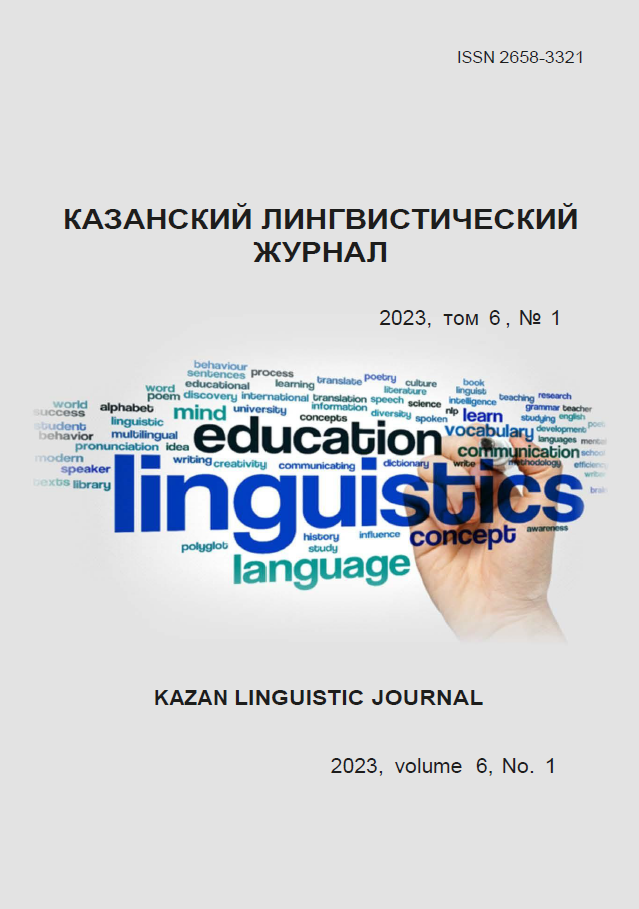Self-presentation gender specificity of modern British politicians
https://doi.org/10.26907/2658-3321.2023.6.1.90-100
Keywords:
verbal behavior, gender specificity, self-presentationAbstract
The purpose of this article is to study the gender specificity of the self-presentation strategy of modern politicians in the UK, identified during the election campaign of Rishi Sunak and Liz Truss from June to September 2022.The material of the study was the texts of political debates published on the Internet.The relevance of the research is determined by the insufficient study of the politician's self-presentation strategy gender aspect in the texts of pre-election debates. After analyzing the debate materials, it can be stated that Liz Truss's speech is distinguished by assertiveness and moderate emotionality, expressed through such communicative means as the usage of the first person singular personal pronoun, demonstrative pronoun, anaphora and metaphor. In 75% of the considering cases, the personal pronoun of the first person singular is dominated, in 12% Liz Truss uses the demonstrative pronoun, in 6% – the metaphor and in 6% the politician uses the anaphora.In addition, the candidate for prime minister demonstrates his own competence in matters of domestic politics and economics, actively using the terminological apparatus, which contributes to a successful self-presentation. In turn, Rishi Sunak's speech is characterized by confidence, particularity, reasoning, focusing the attention of the electorate on his best qualities, represented by the use of the first person singular pronoun, the active use of verbs in the future tense, as well as stylistic means such as metaphor. As a result of the analysis, it was found that in 55% of the examples the candidate for prime minister uses the personal pronoun of the first person singular, in 33% verbs in the future tense dominate, and in 11% – metaphor.The study showed that the gender characteristics of the two politicians at the verbal level do not have significant differences. Both policies generally use the same set of language features.
References
References
Botasheva A.K., Miller I.S.The specificity of the political debates within political com-munication during the election period. The Caspian region: Politics, Economics, Culture. 2019; 2 (59): 62–68. DOI 10.21672/1818-510X-2019-59-2-062-068 (In Russ.)
Akhmadeeva E.V. Psychological readiness for self-presentation of studies in dialogical interaction. Bulletin of the Bashkir University. 2021; 26(4): 1187 –1191. DOI: 10.33184/bulletin-bsu-2021.4.57 (In Russ.)
Takhtarova S.S., Pavlov D.V. Speech portrait of the main character of the novel “Inside Mr. Enderby” by Anthony Burges. Bulletin of the Bashkir University. 2022; 27(1): 150–154. DOI: 10.33184/bulletin-bsu-2022.1.27 (In Russ.)
Barashyan V.K. Representation of the social content of gender categories in a linguistic context. Proceedings of the Rostov State University of Communications. 2013; 3: 18–21. (In Russ.)
Pirozhkova I.S. Precedent Name as a Means of Representation of Gender Stereotypes in Political Discourse K. Rice and I. Khakamada. Political linguistics. 2017; 1(61): 91–97. DOI: 10.26170/pl19-06-12 (In Russ.)
Giddens E. Sociology. M.: Editorial URSS; 2005. (In Russ.)
Kuznetsov A.M. On the concept of “gender” and gender linguistics. Sociolinguistics yes-terday and today. 2008; p. 175–194. (In Russ.)
Tayupova O.I. Femininity in medical advertising discourse. Bulletin of the Bashkir Uni-versity. 2022; 27(3): 778–784. DOI: 10.33184/bulletin-bsu-2022.3.49 (In Russ.)
Gasparyan S.K., Knyazyan A.T. Gender stereotypes in the political sphere of modern so-ciety. Philology and culture. 2017; 1(61): 43–49. (In Russ.)
Arustamyan R., Makurina M.A., Pirozhkova I.S. The manifestation of gender character-istics in political discourse. Political linguistics. 2016; 6(60): 244–249. (In Russ.)
Cherches T.E., Svyatokho L.V. Gender stereotypes and gender identity as factors in oc-cupational choice in different professional groups. Actual problems of the humanities and socio-economic sciences. 2022; 3(86): 116–120. (In Russ.)
Epstein O.V. Gender-oriented self-presentation strategy in political discourse. Philologi-cal aspect. 2019; 1(45): 121–131. (In Russ.)
Belova V.F. Peculiarities of parliamentary communication in German. Studia Germanica, Romanica et Comparastica. 2019; 4(46): 5–14. (In Russ.)
Alferov A.V., Popova G.E., Chervonny A.M. Languages in the political space of con-temporary Europe and in the European Parliament. Political linguistics. 2016; 3(57): 10–17. (In Russ.)
Nguyen T.M. Verbal disagreement strategies in political discourse (on the material of Vietnamese parliamentary discourse). Vestnik of the Moscow State Linguistic University. Humani-tarian sciences. 2022; 6(861): 99–106. DOI: 10.52070/2542-2197_2022_6_861_99 (In Russ.)
Spiridovsky O.V. Linguistic and cultural characteristics of American presidential rhetoric as a type of political discourse: dis. … Cand.Sc. Philology. Voronezh: VGU, 2006. 255p. (In Russ.)
Khudyakov A.V. Modern studies of presidential discourse: theoretical background and prospects. Philological Sciences. Questions of theory and practice. 2015; 2(44): 206–208. (In Russ.)
Gavrilova M.V. Some features of the speech portrait of the first president of Russia B.N. Yeltsin. Political linguistics. 2012; 4(42): 17–22. (In Russ.)
Khalatyan A.B. Election Discourse: Genre Originality and Specificity of Linguistic Em-bodiment on the Material of 2008 Election Campaign Texts in Russia and the USA: extended ab-stract of dissertation. 2011. (In Russ.)
Levshina N.G. Indirect speech tactics in the pre-election discourse: On the material of the election of the Head of the Administration of the Pskov region: extended abstract of dissertation. 2005. (In Russ.)
Live: ITV Debate for Britain's next prime minister hosted by Julie Etchingham. Available from: https://www.youtube.com/watch?v=JL2GPPuxjn4&t=3252s [accessed 12.12.2022] (In Eng.)
Longman Active Study Dictionary 5th edition. Person Education Limited. 1040 p. (In Eng.)
Tayupova O.I. Repetitions and their role in the texts of different discourses. Bulletin of the Bashkir University. 2019; 24(1): 220–224. DOI: https://doi.org/10.33184/bulletin-bsu-2019.1.38 (In Russ.)






